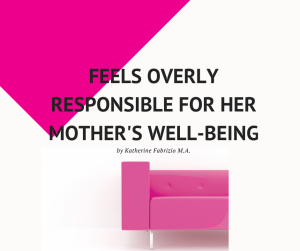.
At the end of this article-
You will be able to tell if you suffer from the long-lasting effects/symptoms of being a daughter of a covert narcissistic mother.
Before we get to the symptoms of daughters of covert narcissistic mothers, let’s begin with a description of the difference between an overt narcissistic mother and a covert narcissistic mother.
(If you need a refresher, I’ve gone into great detail describing what constitutes a covert narcissistic mother here.)
Here, I summarize the outstanding characteristics and how they differ. When you see them you can better understand where your particular mother is coming from, so that you can free yourself from her psychological grip.
The basic difference between an OVERT and a COVERT narcissistic mother
Your typical overt narcissistic mother is easy to spot. She talks nonstop about herself, is openly critical, thinks she is the best at everything, and makes sure everyone knows it.
As obnoxious as she can be, you can see her coming a mile away.
The covert narcissistic mother has more of a velvet-gloved iron fist.
More typically, she underplays her hand, comes off as the victim, and does her dirty work in more surreptitious ways. She undermines others rather than openly competing with them. She provokes guilt and shame in others rather than the overt bullying ways of the typical narcissist.
The way she relates may look harmless on the outside, but underneath her carefully constructed social facade, you will find a master manipulator with a hidden agenda.
In summary, a covert narcissistic mother still needs to feel special- she hides it better.
Her parenting style is built on enmeshment, parentification, and appropriation. If you are the daughter of a covert narcissist, the boundaries between you are blurred.
You can’t be sure where Mom ends and you begin.
These elements lay the groundwork for understanding her impact on you. Let’s take a closer look and see if you relate.
Ways a Covert Narcissistic Mother Affects Her Daughter
Symptom #1) You Feel Chronically Guilty
Mom keeps her daughter on a short emotional leash. Her daughter feels guilty whenever she steps out on her own. This can be having a different opinion, having another close relationship, or making a decision on her own.
Half the time, she isn’t even sure why she feels guilty.
Mom has her so well trained that she can’t make a move on her own, say no, or do anything Mom experiences as rejection without feeling guilty.
Never mind—this is entirely unfair, unhealthy, and mostly unconscious. Moreover the expectation that her daughter be at her mother’s beck and call are implied rather than outwardly stated.
Non-the-less, break those “rules,” and the Mom will let you know in no uncertain terms that you are out of bounds.
For the daughter of the covert narcissist, guilt is her default emotion.
Ways a Covert Narcissistic Mother Affects Her Daughter
Symptom # 2) You Never Feel Good Enough
Seemingly “supportive” on the outside yet unrelentingly judgmental in private, the covert narcissistic mother finds her daughter lacking or ” not good enough.” She constantly needs to critique and ” improve” her.
Driving this dynamic is the mother’s need to project her flaws onto her daughter. She actually needs her daughter to fall short of the mark to keep up this dysfunctional dynamic.
When you internalize Mom’s critical voice, perfection becomes the only acceptable standard. And perfectionism is a relentlessly cruel taskmaster.
Ways a Covert Narcissistic Mother Affects Her Daughter
Symptom #3) You Feel Overly Responsible for Mother’s Well-Being
Although rarely stated explicitly, covert narcissistic mothers expect their daughters to take care of them emotionally. The familiar phrase, “If momma ain’t happy, ain’t nobody happy,” rings all too true in your experience.
While it might seem that the over-involved, micromanaging, intrusive, covert narcissistic mother is caring for her daughter, a closer look will tell you that it is Mom’s need to be needed that runs the show.
As an attuned daughter, especially one in the role of the Good Daughter, you understand the assignment—make sure Mom is okay, and okay with you.
Ways a Covert Narcissistic Mother Affects Her Daughter
Symptom # 4) You Struggle With Setting Boundaries
Because the lines are purposefully blurred between mother and daughter, setting a boundary (or even thinking about setting one)…somehow feels wrong.
A boundary goes against everything you have been programmed to think and feel.
When your individuation has been actively undermined at every turn, you either won’t entertain setting a boundary or will cave at the first sign of pushback when you do set one.
Ways a Covert Narcissistic Mother Affects Her Daughter
Symptom # 5) You Feel Chronically Confused
Mom can be your loudest, most ardent cheerleader. She can be in your corner, bragging to her friends about your accomplishments as if they were her own. Well, yes, there’s that. She can be a relentless critic, but mostly behind the scenes.
On the one hand, you could say the two of you are close, suffocatingly close. Make a move without her, and there will be questions.
Sometimes, when all the stars align and Mom is in a great mood, she can be pleasant, even kind.
The problem is, you can’t count on it. Her moods dictate whether this will be a good conversation or WWIII.
And here’s where the confusion sets in. Is Mom on your side or against you?
Despite the confusion, one thing is for certain- You can tell in a nanosecond if she’s okay and okay with you. You are so acutely attuned to her moods you know by her tone where a conversation with her is headed or if you are ” in trouble”.
Ways a Covert Narcissistic Mother Affects Her Daughter
Symptom #6) You Take the Blame When It Isn’t Your Fault
Because you are used to a Mom who always has to be right and seldom, if ever, concedes defeat, you are trained to short-circuit the argument and take the blame to spare yourself the trouble.
Mom has Teflon to anything resembling accountability for herself, whereas she manages to hold you to an incredibly high standard. As a result, you second-guess yourself, apologize preemptively, and over-explain when no explanation is needed!
Ways a Covert Narcissistic Mother Affects Her Daughter
Symptom # 7) You Are At Risk for Depression and Anxiety
Growing up with a mother who isn’t capable of putting your developmental needs ahead of her own in a reliable and consistent enough way can leave you with an insecure attachment style.
Children need parents who feel good enough about themselves to put their own needs aside while making emotional room for their children’s needs—not all the time, but enough of the time.
If Mom didn’t get what she needed during her childhood, she may come to motherhood driven to extract the attention and sense of being special from her daughter instead of giving her this experience.
If your mother suffers from covert narcissism, you have had to develop coping styles that compensate for your mother’s lack; various ways in which you put your needs on the back burner and attend to your mother’s needs.
And those coping mechanisms cost you psychologically.
Codependency, people-pleasing, and perfectionism are all possible ways you cheat yourself while taking emotional care of her .
Anxiety
Anxiety can result from the inconsistencies in her support ( either present day or resulting from childhood). Additionally, you might feel that you are living from one crisis to another, tied in an uncomfortable way to Mom’s well-being.
You might feel you can’t relax until everything is alright for her, despite your best efforts, that never or rarely comes. Her constant state of upset unsettles you.
Additionally, a covert narcissistic mother frequently employs the silent treatment in her bag of dysfunctional tricks. While this causes unbearable levels of anxiety in a child, it can also bring on anxiety in a grown daughter.
Depression
Depression can set in when you feel hopeless that it will ever be your turn, when you chronically bury your needs in the service of someone else, particularly when that someone is your mother.
Additionally, anger (both buried and on the surface) that results from waiting to live your life or having your life chronically hijacked can result in exhaustion and eventual depression.
I get it.
Mother-daughter relationships can be full of challenges and tension at the best of times. I should know. In addition to treating women in psychotherapy for over 35 years, I’ve raised two daughters to adulthood who have children of their own. There certainly have been challenges along the way.
Letting them go was hard, and I didn’t always do it smoothly. But it is a worthy challenge.
If you recognize yourself in the list of symptoms above, it might help you to investigate further and explore whether you are suffering from this disempowering Good Daughter dynamic.
Here’s the bottom line-
If your mother is a Covert Narcissist, she has parented you from a place of hurt, deception, and pain. As such, you have been fed a steady (emotional) diet of smoke and mirrors. Nothing is what it seems on the surface.
That’s the bad news.
The good news is that awareness is the first step to healing.
When you finally understand what makes your mother tick, you can start to piece together your childhood and understand how to get out from under it..
Identifying the source of your pain and confusion is the foundation for dealing with it and ultimately rising above it.
If you want to learn more about this dynamic and, more importantly, how to escape it, I have written a book about it: The Good Daughter Syndrome®—Help for Empathic Daughters of Narcissistic, Borderline, or Difficult Mothers Trapped in the Good Daughter Role. Read the reviews to see if it is a good fit for you.
Continue the journey with me.
Suggested further reading:
When Mom Won’t Let Go https://daughtersrising.info/2017/12/13/when-mothers-wont-let-go-of-their-adult-daughters/
Is Your Mother a Covert Narcissist? https://daughtersrising.info/2021/04/09/covert-narcissistic-mother/
The Effect of Being Raised By A Mother With BPD https://daughtersrising.info/2021/09/20/bpd-mother-7-effects-she-has-on-her-daughter/
Setting Guilt-Free Boundaries https://daughtersrising.info/2024/07/13/setting-guilt-free-boundaries-with-mom/
Passive Father https://daughtersrising.info/2024/03/26/dont-upset-your-mother-narcissistic-mother-passive-enabling-father/
The Good Daughter Syndrome® https://daughtersrising.info/2024/03/20/what-is-the-good-daughter-syndrome-do-i-have-it/
How to Deal with a Guilt-Tripping Mother https://daughtersrising.info/2022/11/20/guilt-tripping-mother/














Wow, this combination of traits really describes me. Though thankfully by my late 20s/early 30s, I was able to spot the unhealthy dynamics with friends/romantic interests/bosses and not engage with those kind of people further (so basically no friends from my “youth” remaining, and would have to restart there). I’m hopeful in the future I can form some relationships with “healthy” people, but it seems difficult to break in, and it’s not something I think I’ve ever really had, so it’s hard to know how to go about it or what it should be like (because I’m sure it won’t feel “normal” at first).
It’s just difficult, because you feel alone in the world. And though my dad isn’t so bad, and not in the same ways, he’s been out of the picture for the most part (divorced my mother young), and has the take of “yeah, that sucks; I know, I lived with her”, but no real support beyond that. I have some resentment towards him as well for just leaving me in the situation knowing he knew, and not doing more to support me, but maybe he tried or there was no way for him to do more.
Anyway, I’ve thankfully been having more frequent moments of self-worth despite the treatment from others I have received throughout my life (from parents, and the friends/acquaintances I have engaged with or allowed to treat me that way). I still get disrespected now by some people, which I’m not sure is due to looking young for my age or not fitting the stereotype of a “man” or just coming off as a target for that, but I have realized that every moment I have a choice of how I act and respond to things, and I don’t need to go along with being disrespected. I don’t need to “fight back” and I can’t wait for or expect anyone else to “have my back” (like I presumably should have learned to do for myself in the home environment from my parents). I guess I just have to vouch for myself (internally) that no, I don’t deserve that, and no, I’m not going to “buy into” the message that someone is trying to send me with that treatment.
Dear Anon,
Thanks for writing in and sharing your experience. I imagine others will benefit from your firsthand account. Best of luck in finding your people. I feel certain they are out there, and you will find them.
Take care,
Katherine
I can see myself in this both ways – as the daughter and as the mother. I am 53 yrs old and have always been a chronic people pleaser despite the fact that I had a good childhood and parents that love me very much, so I have been perplexed as to why I crave other peoples affection – cannot stand to be disliked – am constantly needing people to like me, especially my husband and kids. when they are unhappy the first thing I do is spiral into thinking it is something I did, its my fault, and I have to fix it and do something or say something in order for them to like me again. It gets to the point where I also want their significant others to like me so obsess over that as well. I am FINALLY starting to recognize how toxic it is and how toxic it has been to my children. Their father had a rough childhood and has major abandonment issues but his stem from actual physical and emotional abuse from both parents while mine stems from a mother that wasn’t healed and emotionally stable herself by no real fault of her own and loved my immensely, but I also. feel all of these things – constant guilt, constant need to defend, sneaking around trying to see what my girls are doing and who they are talking to and what they might be saying about me when it isn’t even about me.
I just want to heal myself so I can be whole and “grown up”and be a better example for my kids, but also part of me constantly feels like I have messed them up too much and its too late. My son is 26, my daughters are 22 and 17, and my 22 year old is about to get married to an amazing young man, but even that – I basically hand picked the young man and made sure to keep him in my daughters life until she finally recognized that he was amazing for her, and now I have another young man that I am doing the same thing with my other daughter even though she isn’t really interested in him and yet he is soooo good to her that I find myself wishing I had fallen for someone like that that dotes on me and that feels so wrong.
I want to do better, but I don’t know what to do and everyone wants to charge me a fortune to try and “stabilize my nervous system” or learn to react differently, but I cannot afford it. What I do have is time.
Will the book help me to do better for my own daughters even this late in the game?
Hi Marnie-
I applaud your candor. Self-awareness like yours is rare and a gift to you and everyone in your family. As a mother of grown daughters, I resonate with the pull to orchestrate their lives at the same time knowing that it isn’t good for them.
I hear you about therapy- it is out of reach for many, if not most. And you may not have access to a therapist with specific training and experience in this particular area. You can access many good meditation videos to help regulate your nervous system for free.
Here is what I would recommend.
Go to the Amazon page where my book is available. Read the reviews- even the unfavorable ones. That’s probably the best way to see if the book would help you. In answer to your questions,-no, it’s not too late for you or your daughters. As you will read, it’s not about being perfect, it’s about being able to repair our inevitable missteps. And yes, if you are willing to take some strong medicine, I think it might help a great deal. I’d like to hear back from you after you read the book.
Best of luck from one imperfect mother to another,
Katherine